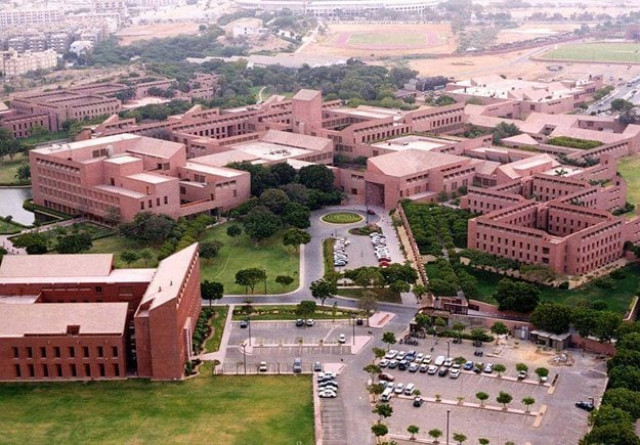Levelling the playing field: AKU-EB — a game-changer for transparent exam marking
E-marking software employs 10 examiners to mark each question, removing any chance of bias

Aga Khan University. PHOTO: fb.com/AKUH
AKU-EB is committed to maintaining transparency and confidentiality and to sustain this they have ensured that their assessment and results are reliable and match with international standards. "We aim to provide opportunities for students by being assessed through a fair and transparent system," said AKU-EB director Dr Shehzad Jeeva.
To make the system more reliable, he said that they have installed CCTV cameras in most of their examination centres and the rest will be completed by May 2017. "Seventy-five per cent of our centres have been covered through CCTV cameras and this will be completed by next year's examinations," said Dr Jeeva, adding that currently the e-marking is used to mark Secondary School Certificate and Higher Secondary School Certificate annual exam papers.
Explaining the marking software and process of e-marking at the AKU-EB, the senior examiner for chemistry, environmental studies and home economics, Afreen Kanwal told The Express Tribune that the marking teams comprise fixe examiners and one senior examiner, all of whom are supervised by subject specialists. Each examiner has a separate ID and password to log in to the system for marking the papers.
When students complete their exams, their papers are scanned by the operation team and are then entered into the system. The examiners are then assigned questions, explained the operations department manager Aqeel Farooq. Scanning all the answer sheets takes around 15 days but the e-markers do not wait for all the papers to be scanned before beginning the e-marking, he said, adding that AKU-EB uses scanning machines, which have the capacity to scan 50 papers per minute.

Kanwal explained that each examiner only checks a single question on each paper. The e-marking software has eight options for examiners to choose - marked, parked, remarked, rescan, reviewed, unmarked, verified and escalate. The examiner can check and verify the answers via the answer key saved in the software, she explained.
After marking the question, the examiner will save it as 'marked' but if there is any confusion and the examiner needs more time to check the answer they can 'park' the question. If the examiner has any conceptual confusion and is having problems in marking the question, they can 'escalate' it to the senior examiner and can also add comments in the message box. Likewise, other options include rescan, in which the answer sheet can be sent to the operations department if the scanned picture is not clear enough.
Associate assessment director Dr Naveed Yousuf explained that the examiner cannot be involved in any biased checking. Each paper is checked by 10 different teachers, as each examiner just marks one question. "The e-marking team is divided into groups; five people are assigned to only check question number one, while another five are assigned for question number two," he explained.
"We mostly invite teachers for e-marking who are associated with the schools affiliated with us, however, there are also some who are not affiliated with us but have vast experience in the field of teaching," said Dr Yousuf.
AKU-EB provides good quality and transparency at subsidised rates for students so that they do not have to bear the cost of 'good examination systems'. "Students have access to an international-level facility at subsidised rates, while we bear around 66% of the cost," shared Jeeva.
On whether AKU-EB can accommodate the students of Karachi board, Dr Jeeva said they will need more e-markers, more stations and bigger servers to make this happen. Their system is only enough for the 9,000 students they are currently serving.
Dr Yousuf said they will be launching self-assessment software from next year, where students will be given log in IDs and passwords and can assess their own answers for particular chapters, topics and subjects. "Students can get an idea of how prepared they are for examinations using this programme," he added.
Published in The Express Tribune, June 10th, 2016.



















COMMENTS
Comments are moderated and generally will be posted if they are on-topic and not abusive.
For more information, please see our Comments FAQ